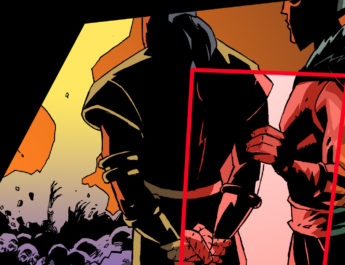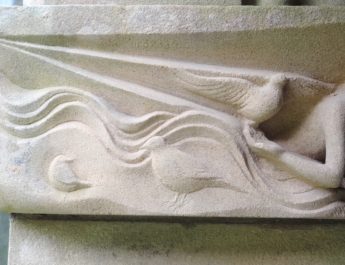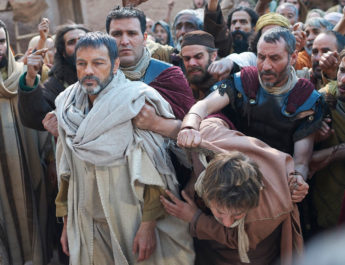Luke 12:32-40
Ordinary C37
32 “Do not be afraid,A littleB flock,C
A “be afraid” = phobeo. From phobos (panic flight, fear, fear being caused, terror, alarm, that which causes fear, reverence, respect); from phebomai (to flee, withdraw, be put to flight). This is also to put to flight, terrify, frighten, dread, reverence, to withdraw or avoid. It is sometimes used in a positive sense to mean the fear of the Lord, echoing Old Testament language. More commonly, it is fear of following God’s path. This is where the word phobia comes from.
B “little” = mikros. This is small in reference to a size or the number of something, least or less. Figuratively, it can refer to little dignity.
C “flock” = poimnion. 5x in NT. From poimne (flock or fold in a literal or figurative sense – usually sheep or goats); from poimen (shepherd in a literal or figurative sense – one who feeds, protects, rules). This is a flock, which can refer to believers.
for it is your Father’sD good pleasureE to giveF you the kingdom.G
D “Father’s” = Pater. This is father in a literal or figurative sense. Could be elder, senior, ancestor, originator, or patriarch.
E “is…good pleasure” = eudokeo. From eu (good, well, well done) + dokeo (to have an opinion, seem, appear, suppose; a personal judgment; to think); from dokos (opinion). This is to think well of, to be pleased or resolved. Properly, this is what someone finds good or acceptable – approving of some action or generally thinking well of.
F “give” = didomi. To give, offer, place, bestow, deliver. This is give in a literal or figurative sense.
G “kingdom” = basileia. From basileus (king, emperor, sovereign); probably from basis (step, hence foot; a pace); from baino (to walk, to go). This is kingdom, rule, authority, sovereignty, royalty, a realm.
33 SellH your possessionsI and give alms.J MakeK pursesL for yourselves that do not wear out,M
H “sell” = poleo. This is to barter or sell. It can also refer to the thing that is sold.
I “possessions” = huparcho. From hupo (by, under, about, subordinate to) + archo (to rule, begin, have first rank or have political power). This is to begin or be ready, to exist or possess. It is what one already has or possesses.
J “alms” = eleemosune. 13x in NT. From eleos (mercy, pity, tender mercy, or compassion; generally understood in action by word or deed). This is mercy, pity, alms, or charity. It is compassion as enacted towards the poor. When we sing or say “kyrie eleison” (Lord, have mercy), it is from this root verb.
K “make” = poieo. This is to make, do, act, construct, abide, or cause.
L “purses” = ballantion. 4x in NT. Perhaps from ballo (to throw, cast, place, put, drop). This is a purse or money bag.
M “wear out” = palaioo. 4x in NT. From palaios (old, ancient); {from palai (former, of old); perhaps from palin (back, again, further)}. This is to wear out, become obsolete, grow old, decay.
an unfailingN treasureO in heaven,P where no thiefQ comes nearR
N “unfailing” = anekleiptos. 1x in NT. From a (not, without) + ekleipo (to leave out, omit, cease, be obscured, die out); {from ek (from, from out of) + leipo (to leave behind, remain, lack, abandon, fall behind while racing)}. This is unfailing, not left behind, inexhaustible.
O “treasure” = thesauros. 17x in NT. From tithemi (to place, lay, set, establish). This is treasure, storehouse, deposit. It can be used figuratively for treasured thoughts.
P “heaven” = ouranos. May be related to oros (mountain, hill) with the notion of height. This is the air, the sky, the atmosphere, and heaven. It is the sky that is visible and the spiritual heaven where God dwells. Heaven implies happiness, power, and eternity.
Q “thief” = kleptes. 16x in NT. From klepto (to steal secretively). This is a thief that steals using stealth rather than violence. It is a thief in a literal or figurative sense.
R “comes near” = eggizo. From eggus (nearby or near in time). This is extremely close by – approaching, at hand, immediately imminent.
and no mothS destroys.T 34 For where your treasure is, there your heartU will be also.
S “moth” = ses. 3x in NT. Perhaps from Hebrew sas (moth, grub); perhaps from the same as sus (root may mean to skip as in jump for joy; a crane or a swift bird; a horse as leaping). This is moth.
T “destroys” = diaphtheiro. 6x in NT. From dia (through, across to the other side, thoroughly) + from phtheiro (to destroy, corrupt, ruin, deteriorate, wither; also used of moral corruption); {from phthio (perish, waste away)}. This is to destroy, spoil, corrupt, disintegrate, decay. It can refer to the effect of moral or spiritual impurity.
U “heart” = kardia. Literally the heart, but figuratively mind, character, inner self, will, intention, thoughts, feelings. Also, the center of something. The word heart is only used figuratively in the Old and New Testaments. This is where “cardiac” comes from.
35 “Be dressedV for action and have your lampsW lit;X
V “be dressed” = eimi + su + ho + osphus + perizonnumi. Literally, “let your waist be girded about.” Osphus is 8x in NT. This is waist, hips, or loins. Perizonnumi is 6x in NT. From peri (all-around, encompassing, excess) + zonnumi (to gird, prepare for an active task; to gird up your loins so that you are able to move fast); {perhaps from zone (belt, waistband, purse); probably related to zugos (yoke, set of scales; what unites people in shared work; servitude or obligation); from zeugnumi (to yoke)}. This is to gird or clothe. It is to get ready for something that requires one to be active or for travel. It can be used in a literal or figurative sense.
W “lamps” = luchnos. 14x in NT. Perhaps from the base of leukos (bright, white, brilliant); from luke (light). This is a lamp that is portable and fueled by oil. It can mean light in a literal or figurative sense.
X “lit” = kaio. 11x in NT. This is to kindle, light, blaze. It is light in a literal or figurative sense.
36 be like thoseY who are waiting forZ their masterAA to returnBB from the wedding banquet,CC
Y “those” = anthropos. Probably from aner (man, male, husband) + ops (eye, face); {from optanomai (to appear, be seen); perhaps from horao (become, seem, appear)}. This is human, humankind. Used for all genders.
Z “waiting for” = prosdechomai. 14x in NT. From pros (at, to, toward, with) + dechomai (to warmly receive, be ready for what is offered, take, accept, or welcome; to receive in a literal or figurative sense). This is to receive, welcome, expect, accept. It is reception with a warm, personal welcome or active waiting. It can also mean endurance or patience.
AA “master” = kurios. From kuros (authority, supremacy). This is a respectful address meaning master or sir. It refers to one who has control or power greater than one’s own. So, it was also applied to God and Jesus as Master or Lord.
BB “return” = analuo. 2x in NT. From ana (up, again, back, among, anew) + luo (to loose, release, untie; figuratively, to break, destroy, or annul; releasing what had been withheld). This is to unloose in order to depart. So, it is depart in a literal or figurative sense, break up, return.
CC “wedding banquet” = gamos. 16x in NT. This is a wedding, whether the ceremony, the feast, or the marriage itself.
so that they may openDD the door for him as soon asEE he comesFF and knocks.GG
DD “open” = anoigo. From ana (up, back, again, among, between, anew) + oigo (to open). This is to open in literal or figurative sense.
EE “as soon as” = eutheos. Related to “is…good pleasure” in v32 & “treasure” in v33. From euthus (immediately, upright, straight and not crooked); {perhaps from eu (see note E above) + tithemi (see note O above)}. This is directly, soon, at once.
FF “comes” = erchomai. This is to come or go.
GG “knocks” = krouo. 9x in NT. To knock, hit a door with a stick in order to enter.
37 BlessedHH are those slavesII whom the master findsJJ alertKK when he comes;
HH “blessed” = makarios. From makar (happy); from mak– (to become long or large). This is blessed, happy, fortunate. It is when God’s grace/abundance is extended.
II “slaves” = doulos. Perhaps from deo (to tie, bind, fasten, impel, compel; to declare something against the law or prohibited). This is used for a servant or for a slave, enslaved. It refers to someone who belongs to someone else. But, it could be voluntary (choosing to be enslaved to pay off debt) or involuntary (captured in war and enslaved). It is used as a metaphor for serving Christ. Slavery was not inherited (i.e. the children of slaves were not assumed to be slaves) and slaves could buy their way to freedom. Slavery was generally on a contractual basis (that is for the duration of how long it took you to pay your debt and/or save up enough money to buy your freedom).
JJ “finds” = heurisko. This is to find, learn, or obtain. It is to discover something, which generally implies a period of searching for it. This is to find in a literal or figurative sense. This is where the word “heuristic” comes from.
KK “alert” = gregoreo. From egeiro (to awake, raise up or lift up; to get up from sitting or lying down, to get up from sleeping, to rise from a disease or from death; figuratively, rising from inactivity or from ruins). This is to be or stay awake, watch. Figuratively, it can be alertness or vigilance.
trulyLL I tellMM you, he will fasten his beltNN
LL “truly” = amen. From Hebrew amen (verily, truly, amen, truth, so be it, faithfulness); from aman (to believe, endure, fulfill, confirm, support, be faithful, put one’s trust in, be steadfast. Figuratively, this is to be firm, steadfast, or faithful, trusting, believing, being permanent, morally solid). This word is literally firmness, but figuratively fidelity, faithfulness, honesty, responsibility, trust, truth, steadfastness. Properly, it is to be sure, certain, or firm. This is a word of emphasis indicating that something crucial follows.
MM “tell” = lego. This is to speak, say, name, call, command. It is generally to convey verbally.
NN “fasten…belt” = perizonnumi. Same as “be dressed” in v35. See note V above.
and have them sit down to eat,OO and he will comePP and serveQQ them. 38 If he comes during the middle of the night or near dawnRR and finds them so, blessed are those slaves.
OO “sit down to eat” = anaklino. 6x in NT. From ana (up, back, again, among, between, anew) + klino (to slant, rest, recline, approach an end, wear; to bend in a literal or figurative sense – to lay down, a day ending, causing an opposing army to flee). This is to lay down, recline, lie back, or sit down.
PP “come” = parerchomai. Related to “comes” in v36. From para (from beside, by) + erchomai (see note FF above). This is pass by, neglect, disregard. Figuratively, it can mean to perish or to become void.
QQ “serve” = diakoneo. To give, offer, place, bestow, deliver. This is give in a literal or figurative sense.
RR “middle of the night or near dawn” = deuteros + kan + ho + tritos + phulake. Literally, “in the second or in the third watch.” Deuteros is from duo (two, both). This is second, twice, again. It is part of where “Deuteronomy” comes from, which means “second law” or “a repetition of the law.” See https://en.wiktionary.org/wiki/Deuteronomy Tritos is from treis (three). This is third. Phulake is from phulasso (to guard something so that it doesn’t escape – to watch over it vigilantly; being on guard in a literal or figurative sense); related to phulaks (military guard, sentry, watcher). This is the act of guarding, the person who guards, the place where guarding occurs (i.e. a prison), or the times of guarding (the various watches).
39 “But knowSS this: if the owner of the houseTT had knownUU at what hourVV the thief was coming,WW, XX
SS “know” = ginosko. This is to know, recognize, realize, perceive, learn. It is knowledge gained through personal experience.
TT “owner of the house” = oikodespotes. 12x in NT. From oikos (house – the building, the household, the family, descendants; the temple) + despotes (lord, master, despot; authority who has unrestricted power and jurisdiction) + posis (husband). This is the master of the house, head of a family, or the householder.
UU “known” = eido. This is to know, consider perceive, appreciate, behold, or remember. It means seeing with one’s eyes, but also figuratively, it means perceiving – seeing that becomes understanding. So, by implication, this means knowing or being aware.
VV “hour” = hora. This is a set time or period, an hour, instant, or season. This is where the word “hour” comes from.
WW “coming” = erchomai. Same as “comes” in v36. See note FF above.
XX {untranslated} = gregoreo. Same as “alert” in v37. See note KK above.
he would not have letYY his houseZZ be broken into.AAA 40 You also must beBBB ready,CCC for the SonDDD of ManEEE is comingFFF at an hour you do not expect.”GGG
YY “let” = aphiemi. From apo (from, away from) + hiemi (to send). This is send away, release, permit, forgive, allow to depart, discharge, or send forth.
ZZ “house” = oikos. Related to “owner of the house” in v39. See note TT above.
AAA “be broken into” = diorusso. 4x in NT. From dia (through, for the sake of, across, thoroughly) + orusso (to dig, burrow, or excavate). This is to dig through i.e. break into a house.
BBB “be” = ginomai. This is to come into being, to happen, become, be born. It can be to emerge from one state or condition to another or is coming into being with the sense of movement or growth.
CCC “ready” = hetoimos. 17x in NT. From heteos (fitting, fitness). This is make ready, be ready because of being prepared, standing by, adjusted; ready to meet some opportunity or challenge.
DDD “Son” = Huios. This is son, descendant – a son whether natural born or adopted. It can be used figuratively for other forms of kinship.
EEE “Man” = anthropos. Same as “those” in v36. See note Y above.
FFF “coming” = erchomai. Same as “comes” in v36. See note FF above.
GGG “expect” = dokeo. Related to “is…good pleasure” in v32. See note E above.
Image credit: “Earthly and Heavenly Charity” by Matthias Laurenz Gräff, 2008.




